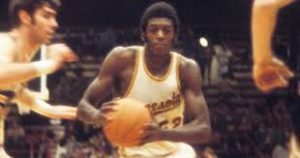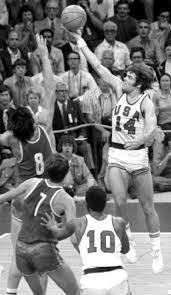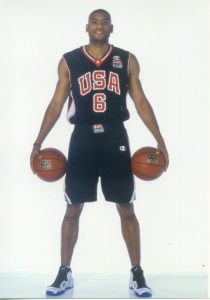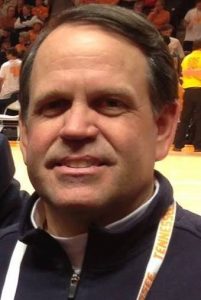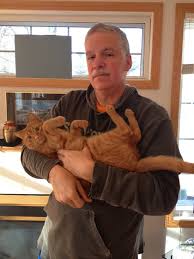The NBA Finals date back to 1947 (when they were known as the Basketball Association of America Finals) and the very 1st NCAA tourney was held in 1939. Olympic basketball competition is even older: it debuted as a demonstration event in 1904 and the men’s version became a medal sport in 1936, with the women finally getting their chance to go for the gold in 1976. The United States has dominated Olympic basketball competition from the start: the men have won 15 gold medals in the 18 tournaments they have participated in during the past 84 years, while the women have won 8 gold medals in the 10 tournaments in which they have competed during the past 44 years. Those of you who were looking forward to the 2020 Olympics opening ceremonies in Tokyo on July 24, 2020 will have to wait an extra 364 days, as the coronavirus caused a postponement until July 23, 2021. Due to the absence of college basketball since mid-March, HoopsHD’s Jon Teitel decided to fill the void by trying to interview as many prior Olympic players/coaches as possible so that you have something to read this summer while not watching the Summer Games. We continue our coverage by chatting with Jim Brewer about being part of the most controversial basketball game in Olympic history and winning an NBA title in 1982. Today marks the 37th anniversary of his nephew Doc Rivers getting picked 31st overall by Atlanta in the 1983 NBA Draft.
You won a state title at Proviso East High School: how good is the basketball scene in the Chicago metro area, and how have the Pirates become 1 of the most successful high school basketball programs in Illinois? We won a title back in 1969 when there was only 1 class of basketball throughout the state before they started breaking it up into Class A/Class AA/etc. It was really rewarding for us because it was a bigger feat than it is today. Coach Tim Millikin built the program after growing up in a rich basketball tradition. We had a lot of players who became coaches themselves and we had a great elementary school “farm system” with players who followed suit, which allowed us to win a few more state titles after that. We were a town of about 26,000 and most of our players came from the Maywood area.
What made you choose Minnesota for college? Coach Millikin produced a lot of solid individual fundamental ballplayers including Al Nuness, who was 1 of the best players to come before me and later helped recruit me to Minnesota. I was very heavily recruited by Illinois: it was close to my home so a lot of my high school friends were there and I could have a lot of family members travel down to watch me play. Al was on the coaching staff of Bill Fitch and Minnesota was a big place where I could get lost in the social scene rather than being in the middle of a city setting. When you have friends around you all the time you might drop what you are doing so that you do not alienate them.
You played for team USA at the 1972 Olympics: what do you remember about Alexander Belov knocking you out of the gold medal game, and who do you blame the most for the controversial loss (Bill Walton for not playing, Hank Iba for using a slow tempo, the Secretary General, the timekeeper, the refs, other)? I think that it was a number of factors that brought us to that moment. We were being criticized leading up to the game. If we won then they would have to take a lot of measures to even the playing field: we were put in a box so that was a factor. Due to the Black September incident the gold medal game was delayed, and once it was finally scheduled the start time was a lot later than our normal time slot. We got off to a bad start and had some interference from outside where Secretary General Jones was telling the refs that they were doing something wrong. I was just all fired-up and was playing okay up to that time. I went up hard for a jump ball and got knocked off balance/hit my head/got knocked out. I was in a daze so it was hard for me to get it together: I still have some memory loss from that game. We had a nice comeback, won it twice, and then the Soviets won it once. You could argue that we were never supposed to be there but that is where we ended up. You can talk about preparation or how we played but for me that was not it. We were successful despite having a player thrown out (Dwight Jones) and several touch fouls called. The game should have been over and we were going to leave the floor but Coach Iba was talked out of it by his 2 assistants. We could have played it under protest but the decision was made by a spectator in the stands rather than someone with authority at the Olympics.
You were an All-American in 1973: how good a basketball player was your teammate Dave Winfield (who later became a Hall of Fame baseball player)? Dave was a raw athlete even though he was not fundamentally sound. He was being looked at by teams in several pro sports but was not even on full-time scholarship during his 1st couple of years on the baseball team. He played a very physical game and helped us win, along with other big guys like 6’9” Ron Behagen. We were so aggressive/physical that we were able to win a lot of games even when we were shorthanded due to some suspensions that left us with a rotation of about 5-7 guys.
That spring you were drafted 2nd overall by Cleveland (1 spot behind Olympic teammate Doug Collins): did you see that as a validation of your college career, or the realization of a lifelong dream of reaching the NBA, or other? I never really looked past college to be perfectly honest. Now there is so much publicity about playing pro but the attention made it worse for me. I just played to win but when they started talking about money it became anticlimactic and I did not have the same zeal/passion. I certainly followed the NBA and was very relieved after living up to expectations because before then the only expectations I cared about were my own. It took a little but of the fun out of it for me. Cleveland traded away 2 guys (John Johnson/Rick Roberson) to get me so I was put into the situation of having to do more because I was replacing a pair of productive guys and the expectation level was way too high that 1st year. If I joined the team while Johnson/Roberson were still there then we would have had a better squad but it was nobody’s fault: I just had to make some adjustments as a very undersized center. It was a little bit too much for me at that point because we did not have a better framework: you just deal with what you are given. Once we started getting guys to fill in those spots we began to have a better chance to win.
You were named to back-to-back NBA All-Defensive teams in 1976/1977: what is the secret to being a great defender? Passion, which is also the key to rebounding. I had a lot of teammates who took 20 shots/game but I got a lot of time on the floor due to my defense. In the modern era you can work year-round to stay in shape but back then guys would not work on their games during the offseason: they were working on their beer bellies! Guys eventually started to become more conscientious as the landscape was changing. There have also been a lot of rule changes in the game.
In the 1982 NBA Finals with the Lakers you beat Philly in 6 games to clinch the title: what did it mean to you to win a title? That was beautiful! I always liked practicing but enjoyed it more being around that team because we had so much fun both on and off the court. Every time we took the court we felt that we were going to win. There is an accountability that you want as an athlete: we looked in the mirror to make sure that we were doing things right. We gave it everything we had every day and always tried to improve.
You played 9 seasons in the NBA and then 3 more in Italy: what was the biggest difference between basketball in the US and basketball overseas? Italy had 40-minute games that were very intense: it was like being in a semi-pro league with a bunch of teenage fans who were basketball nuts. They were very enthusiastic so it was validating: the American guys like me played the whole game and they expected us to move mountains. I really enjoyed my 3 years there and it really prepared me for my post-basketball life, as I had a lot of time to think about the future.
In 2007 you were named as 1 of the 100 Legends of the Illinois High School Association Boys Basketball Tournament: what did it mean to you to receive such an outstanding honor? That was great. The tourney had existed long before I played in it so we had all of this history but if you do not commemorate it then it will be lost. It was very rewarding to be at the ceremony and meet the other players. To be a part of that was a real honor and very satisfying for me.
Your nephew is Doc Rivers and your great nephew is Austin Rivers: who is the best athlete in the family? I think that we are all great athletes. I was 1 of the fastest players on the Lakers…even if the other guys do not agree with that!
Are there any thoughts you would like to share about everything that has been going on in our country recently (George Floyd/protests/police/other)? I think it is sad that someone had to die for us to look at reforming law enforcement behavior that is sworn to protect/serve. I have been chosen to be part of our local fire/police commission and am just starting out. My brother Grady Rivers (Doc’s dad) was a policeman and had a military background. There is a trust factor that has been breached and when you are wondering whose story to believe (such as a false report) there is a need to address/correct it. Now that we understand what Colin Kaepernick was doing when protesting the treatment of people by law enforcement, we need to do what is right and listen to what is happening. We have been hearing about police brutality for many years before Colin, but now that we have cell phones with cameras we can see pictures of what is going on. It is kind of sad that this is where we are at but if we do nothing else but look at police candidates and make the police accountable when something happens rather than sweeping it under the rug, then we will be in a better position. The crime must fit the punishment.
For more info about the 1972 US Olympic team check out “Stolen Glory” by Mike Brewster and Taps Gallagher at: www.amazon.com/Stolen-Glory-Mike-Brewster/dp/1882383796

